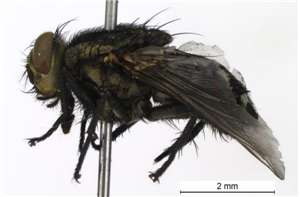Subfamily:
Sarcophaginae
Genus: Sarcophaga
Meigen 1826
Subgenus: Parasarcophaga
Johnston & Tiegs 1921
Species: misera Walker 1849
Distribution
AUSTRALASIAN/OCEANIAN
� (Australia �New South Wales, Northern Territory,
Queensland, Victoria, Western Australia), ORIENTAL,
PALAEARCTIC.
Biology
Sarcophaga misera has been caught at decayed carrion-baits, human
faeces, carcasses and dead fish (Das and Dasgupta, 1982; P�rez-Moreno
et al., 2006). This species has been documented as one of
Queensland�s sheep myiasis flies (referred to as Sarcophaga
frontalis;
Tyron, 1917) and as a predator of the snail Indoplanorbis
exustus (Parashar et al., 1997).
Taxonomy
The third-instar
larva was described by Ishijima (1967). DNA barcode
sequences of S. misera have been
deposited in both GenBank and BOLD.
References
Das, S.K., and Dasgupta, B. (1982)
Seasonal occurance of blow-flies and flesh-flies
in Calcutta
Oriental Insects 16(1),
119-128.
Ishijima,
H. (1967) Revision of the third stage larvae of
synanthropic flies of Japan (Diptera: Anthomyiidae,
Muscidae, Calliphoridae and Sarcophagidae). Japanese
Journal of Sanitary Zoology 18,
47-200.
Parashar,
B.D., Rao, Y.V.S., and Rao, K.M. (1997) Effect of
environmental temperature on development fecundity,
survival and predation of the snail-predator Sarcophaga
misera (Dipt., Sarcophagidae). Entomophaga
42(3), 343-347.
P�rez-Moreno, S., Marcos-Garc�a, M.A.,
and Rojo, S. (2006) Comparative morphology of
early stages of two Mediterranean Sarcophaga
Meigen, 1826 (Diptera; Sarcophagidae) and a review
of the feeding habits of Palaearctic species. Micron
37(2), 169-179.
Tyron, H. (1917) Report of the
Government Entomologist. Annual
report of the Department of Agriculture,
Queensland. p. 53.
Walker,
F. (1849) 'List of the specimens of dipterous
insects in the collection of the British Museum.'
(British Museum: London) Part IV. pp. 689-1172.





